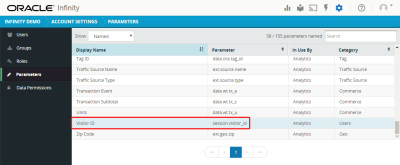Visitor session parameters
Visitor session parameters provide data about events that occur during the session.
Note: These parameters are visible in the streams UI and are available for use in streams queries. Only session.visitor_id is visible in reports.
Active or closed
(Streams only) session.closed indicates whether the session is active (false) or closed (true).
| Valid value | true or false |
| Syntax | session.closed={true|false}
|
| Example | session.closed=false
|
Duration limit
(Streams only) session.duration.limit indicates the maximum time, in milliseconds, for an active session until the session is closed.
| Valid value | Integer |
| Syntax | session.duration.limit=limit_in_milliseconds
|
| Example | session.duration.limit=1440000
|
Duration
(Streams only) session.time_on_site indicates the duration, in seconds, of the session.
| Valid value | Integer |
| Syntax | session.time_on_site=seconds
|
| Example | session.time_on_site=1570
|
Events received
(Streams only) session.event_count identifies the number of events received in the session.
| Valid value | Integer |
| Syntax | session.event_count=number_of_events
|
| Example | session.event_count=14
|
New or returning visitor
(Streams only) session.returning_visitor indicates whether this is a new visitor (false) or a returning visitor (true).
The default is false unless one of the following is true:
- The session contains
wt.vt_f=1. - The session contains ((
wt.vt_f_tlvorwt.vt_tlv) ANDwt.vt_f_tlv) ORwt.vt_tlvis less than the session's start time.
| Valid value | true or false |
| Syntax | session.returning_visitor={true|false}
|
| Example | session.returning_visitor=true
|
Pages viewed
(Streams only) session.page_view_count identifies the number of pages viewed in the session.
| Valid value | Integer |
| Syntax | session.page_view_count=pages_viewed
|
| Example | session.page_view_count=12
|
Reason for closing
(Streams only) session.closed_reason indicates a reason for a closed session.
| Valid value |
|
| Syntax | session.closed_reason=reason
|
| Example | session.closed_reason=inactivity_limit
|
Session ID
(Streams only) session.session_id indicates the unique ID of the session.
If an event contains the wt.vt_sid parameter, session.session_id will use the part of the wt.vt_sid value after its last ., which is the Unix time in seconds since Jan. 1 1970 UTC.
| Valid value | Alphanumeric string |
| Syntax | session.session_id=.Unix_time
|
| Example | session.session_id=1500408836
|
Start time
(Streams only) session.first_datetime_utc indicates the start time of the session.
| Valid value | Alphanumeric string of the date and time in UTC format |
| Syntax | session.first_datetime_utc=yyyy-MM-ddTHH:mm:ss.SSSZ
|
| Example | session.first_datetime_utc=2017-08-22T20:48:28.000Z
|
Time inactive
(Streams only) session.time_inactive indicates the time, in milliseconds, since the last event from the visitor. This is only included in full_session messages and messages where session.closed=true.
| Valid value | Integer |
| Syntax | session.time_inactive=milliseconds
|
| Example | session.time_inactive=30000
|
Time of most recent event
(Streams only) session.recent_datetime_utc indicates the time of the most recent or last event in the session.
| Valid value | Alphanumeric string of the date and time in UTC format |
| Syntax | session.recent_datetime_utc=yyyy-MM-ddTHH:mm:ss.SSSZ
|
| Example | session.recent_datetime_utc=2017-08-22T20:48:28.000Z
|
Visitor ID
session.visitor_id provides the unique visitor ID. Its value is typically generated after the Oracle Infinity Tag collects the value of wt.co_f. It is visible in the Oracle Infinity UI as Visitor ID.
The following logic provides the value for session.visitor_id:
- If
data.wt.co_fis present, use a hash of its value as the Visitor ID. - If
data.wt.co_fis not present, use a hash of the user agent and IP address pair as the Visitor ID. - If
data.wt.dcsvidis present, a hash of its value is used instead of the Visitor ID.
| Valid value | Alphanumeric string |
| Syntax | session.visitor_id=session_visitor_ID
|
| Example | session.visitor_id=98.250.174.27-2754457152.30285513
|
First event block parameters
You can access all the parameters from the first event of the session. This is made available in the JSON output as the first{} block.
For example, the first event block is made available as first{} in a streams query syntax such as:
select * where first.ext.source.name='Google'
You can also leverage the first.* parameters in your streams lab queries.
